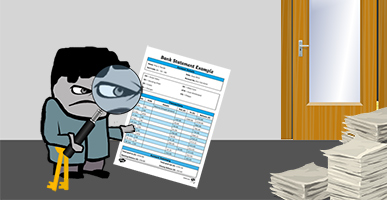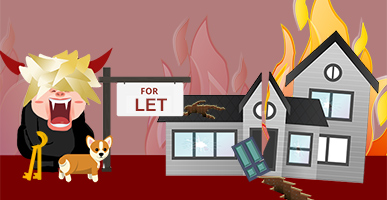
For my sins – so I’m told – I’ve been been a residential landlord for over a decade (and counting). That means I’m dealing with tenants on a daily basis, but it also means I’ve worked through a gigantic amount of prospective tenants that never quite made it as my tenant.
Often, the prospects willingly made the decision to go down another path (and end up with a lesser landlord, of course), but more often, they were dismissed because they fell short of my [reasonable] requirements, so they were quickly ushered out the door before they even had a chance to assess the storage space (always high up on the priority list).
I like to think that my experience has not only made me aware of where, how and why tenants often fall short, but it has also helped me understand the rental process from both a landlords’ and tenants’ perspective.
Yes, this is primarily a landlord blog for landlords, but I’d be amiss if I didn’t share my advice to help tenants, because I genuinely believe I – and other experienced landlords – are able to provide a practical and useful guide that isn’t necessarily available from other tenants themselves.
This general guide is specifically targeted for tenants in England and Wales on an assured shorthold tenancy.
Page contents
- What is a tenant and an Assured Shorthold Tenancy?
- Before you start looking for a rental property
- Where to find your next rental property
- What tenants should check for when looking for a rental!
- What to do once you’ve found a suitable rental property
- What landlord’s should provide tenants with
- Your landlord’s responsibilities
- What tenants should do on move in day
- Your landlord’s responsibilities
- Your responsibilities as a tenant
- Ending a tenancy
- If things go wrong and how to get support
- Lodging official complaints
What is a Tenant and an Assured Shorthold Tenancy?
Most tenancies in the UK are assured shorthold tenancies (AST); it’s a contractual agreement between landlord and tenant, whereby a landlord permits the tenant to rent their property for a specified period of time in exchange for money.
A written tenancy agreement contract contains the terms and conditions of the tenancy, and it’s signed by both parties as a declaration of understanding and acceptance.
However, a common misconception is that a contract must be signed in order for a tenancy to become legally binding and active. That is not true! A tenancy agreement can be a verbal agreement, and it’s just as legally binding. Needless to say, a verbal agreement is not the best way to go about things, to put it nicely.
You can read more about tenancy agreements here.
It’s important to note that a lodger is NOT the same as a tenant. The rules and regulations for lodgers and lodger landlords are completely different. But more importantly, a lodger cannot have an AST.
While there are several differences between a ‘lodger’ and a ‘tenant’, the main giveaway is that if your landlord lives in the same property as you, then you’re most likely a lodger, and not actually a tenant. If your landlord isn’t a live-in landlord, then you’re most likely a tenant.
If you have an itching feeling that you might be a lodger, but you’re not entirely sure, you may want to read more about the differences between a tenant and lodger to help determine your status.
Before you start looking for a rental property
- Stick to a workable budget – it’s critical to assess your finances and determine how much rent you can afford (take into your account both your incoming and outgoings). Don’t stretch yourself!
Generally, 35% of your household’s take-home pay (i.e. after tax deductions) is the most people can afford to pay on rent.
I’ve had applicants enthusiastically turn up for a viewing thinking their £12,000k annual salary could sufficiently absorb £900PCM rent (no bills included).
It was just a massive waste of everyone’s time.
Here’s a blog post that breaks down the costs of being a tenant to help you calculate what you can afford.
- Have a contingency fund – I can’t stress the importance of this; set aside some money to cover any unforeseen expenses.
While it will be your landlord’s responsibility to maintain your property and it keep it in good repair, you could still end up with unexpected utility bills, for example. In those cases, you may need a contingency so you can still pay your rent.
Falling behind on rent creates a very awkward situation for both landlord and tenant, so it’s best avoided.
- Deposit – remember, you will most likely need to pay a deposit at the start of a tenancy. Factor that into your costs.
Deposits usually range between 4 – 6 weeks worth of rent.
Since the 1st of June 2019, the maximum amount a tenant in England can be charged for a deposit is 5 weeks’ worth of rent!
- Tenancy period – consider how long you want to be tied into a contract for.
Most tenancy agreements have a fixed term of either 6 or 12 months. After the fixed term expires, you or your landlord can terminate the tenancy (as long as appropriate notice is given, which is something I cover in more detail further down).
- Pets – not many landlords are pet-friendly (I’m guilty of being one of those landlords, sorry!), so you should bear that in mind if you’re a pet owner – your options quickly become limited!
Landlords that are pet-friendly they will most likely ask for a higher deposit (anywhere between 5-6 weeks worth of rent. Tenants in England are still capped at a maximum of 5 weeks’ rent). It’s unlikely you’ll get away with a 4 week deposit.
- Housing Benefit – are you entitled to Housing Benefit or Universal Credit? If you’re not sure and you suspect you could be, you should contact your local authority to find out if you’re eligible for financial support to help with your rent.
The only issue with tenants’ in receivership of housing benefits is that they tend to find it much more difficult to find landlords that are willing accept their financial situation. So similarly with tenants with pets, the options available become much more limited.
When looking for rental properties, look out for any DSS/Housing benefit disclaimers that indicate the landlords position on the matter.
- Photo ID – landlords will check your identity and take photocopies of your ID to confirm you are who you say you are, and to help determine whether you are legally allowed to rent in the UK.
I’m saying this to help deter anyone that’s trying to pull a fast one.
- Rent Guarantor – most [sensinble] landlords require their tenant’s to have a rent guarantor, so this is something you may need to arrange.
A guarantor is typically a close relative whom is willing to accept responsibility if you miss rent or owe any monies to your landlord. The guarantor will be legally obligated to cover those costs if you refuse to pay.
You can read more details about rent guarantors here, and here’s a guide for tenant’s that don’t have a guarantor (but require one).
- Credit check / references – most landlords and letting agents will run a credit check on tenancy applicants, and also contact their employer, and/or previous landlords for references!
You can check your credit rating by using Experian’s free service. If it’s lousy, you may want to work on improving it.
- Tenancy fees – since 1st June 2019, with the introduction of the “Tenant Fees Act 2019”, it is illegal for landlords and letting agents to enforce any letting fees onto tenants in England. That means you should NOT be charged for things like viewing fees, tenancy set-up, inventories etc.
For a full list of things you can or can’t be charged for, you can read my guide on the “Tenant Fees Act 2019”.
A tenant fee ban is also due to role out for tenants in Wales, but it’s not in place yet. As and when it does, I’ll update this accordingly.
Where to find your next rental property
- Local letting agent – if you go directly through your local letting agent, note the following:
- They are legally obligated to be a member of a independent redress scheme – so check which one they are with! Being a member means the agent is regulated and must adhere to certain standards. If they fall short, you can complain to the scheme directly.
- They are legally obligated to join a ‘client money protection scheme’, so you should check they are a member of one. This means your money is insured, even if your agent goes out of business (which many have over the years).
- As discussed, letting agents in England are NOT allowed to charge tenants with letting fees, apart from those specifically permitted.
- Property Portals – to find the largest range of properties available for rent across the UK, I recommend looking on Rightmove and Zoopla. They hold the largest stock by far, particularly Rightmove.
Note: some private landlords that don’t use a high-street letting agent advertise on those portals, so you may deal directly with the landlord if you make an enquiry. I’m just highlighting the point in case you have a preference of who you wish to deal with. I know some tenants prefer dealing directly with landlords because they despise letting agents, while others don’t have a preference, or prefer letting agents.
- OpenRent – if you’d rather deal directly with a Landlord, it’s worth looking on OpenRent. They’re the UK’s biggest online letting agent, so it’s the place to go to find self-managing landlords with properties available for rent.
- Gumtree – since Gumtree is more of a bargain basement classified website; tenants in receivership of Housing Benefit seem to have better luck on there than anywhere else. And that’s pretty much why I have included them in this list!
So if you’re having a hard time being accepted as a tenant for financial reasons, I think Gumtree might be worth a spin!
However, be warned, Gumtree is notoriously rife with scammers, from both tenants and landlords trying to deceive others.
What tenants should check for when looking for a rental!
- Be wary of scams! – unfortunately, there isn’t a shortage of scams to be wary of.
I have listed a bunch of scams tenants should be wary of. Note the comments section, it’s filled to the brim with stories from tenants who’ve fallen victim – it’s all too common. So be cautious and conduct thorough due diligence.
Two common scams tenants should be wary of:
- Unauthorised sub-letting: The person claiming to be the landlord is actually a tenant attempting to sublet the property. Many fall for this because the tenant has full access to the property, making it easy for them to convincingly play the role of the landlord.
- Deposit scam: For one reason or another, the person portraying to be the landlord/agent has access to the property, and their only aim is to extract a deposit out of you. Once paid, they’ll likely disappear, and you’ll never become a tenant.
To help avoid these scams, always request proof of property ownership.
- Property Ownership – ensure your prospective landlord is who they say they are!
Most tenant’s think that the landlord/agent is only the person that should be doing the referencing, but that’s an extremely naive approach. You need to protect yourself like very other person.
If you’re dealing directly with a landlord, ask them for their ID and also ask to see their Land Registry papers to prove that they own the property! Alternatively, for £3, you can search property ownership information on the Land Registry website. Well worth the investment in my opinion.
- Deposit Protection – if your landlord requires a deposit (some may not, as taking a deposit is not a legal requirement), check that it will be protected in a government approved scheme, and get confirmation on which one.
- Bills – check who is responsible for bills such as broadband, electricity, gas, water and council tax. Typically, it’s the tenant’s responsibility for single-let properties, and it’s usually included with the rent in the case of HMOs (Houses of Multiple Occupation).
- Condition / Fitness for human habitation / Repairs – your property must be safe, healthy and free from things that could cause serious harm throughout the tenancy. If you have any safety concerns, you should raise your concern(s)… or find a more suitable property.
Here is a guide on what your landlord is responsible for in regards to repairs and maintenance.
- Get repairs resolved first – be wary of landlords/agents that promise to have any outstanding repairs to the property resolved before move in day!
I’ve heard of many situations where landlords/agents make the promise in order to secure the tenant, but fail to delivery. In the mean time, the tenant signs the tenancy agreement and moves into the property with outstanding repairs. It often takes months to resolve, and some times it never gets resolved.
I personally wouldn’t recommend signing a tenancy until ALL significant repairs are resolved first.
- Parking – if you require parking space, check what the situation is. Do you have allocated parking space? Do you need a permit? Do your guests need a permit?
- Ask Questions – don’t be scared to ask questions! Any useful agent or landlord will happily answer any of your questions. If you’re unsure about anything – regardless of how small – please, ask!
If you’re dealing directly with a landlord who seems annoyed or inconvenienced by your questions, I’d consider that a red flag. They’ll likely to show the same lack of interest when addressing concerns during your tenancy (i.e. when reporting any maintenance issues).
What to do once you’ve found a suitable rental property
- Don’t hesitate – if you feel like you have found the perfect property, don’t waste time; do your due diligence, get the papers signed and pay the deposit.
Landlords don’t like waiting around because they generally want to secure tenants ASAP. A sensible landlord will continue looking for tenants until they have completely secured a tenancy (i.e. received a deposit and contracts signed).
If you waste time pondering on the deal, you may miss out.
- Tenancy agreement – check all the terms and conditions of the tenancy agreement.
Tenancy agreements should be written in plain English and easy to understand. If you have any questions or are unsure about anything, make sure you get clarity before signing on the dotted line.
- Guarantor – if a guarantor is required, then you should have one arranged.
You should receive a guarantor contract for your Guarantor to check and sign. The contract is between the landlord and the Guarantor.
The Guarantor should ensure they fully understand the terms and conditions, and raise any questions if in doubt.
- Point of contact – make sure you have the correct contact details for your point of contact, whether it be a letting agent or a landlord directly.
- Contents Insurance – tenants are typically responsible for arranging their own contents insurance to ensure protection for their personal belongings
It’s completely optional, but it is handy and rather quite affordable, typically costing a couple of quid a week. Tenant contents insurance policies protects against damages or theft of items such as laptops, TVs, books, and more. Essentially, anything you own and bring into the rented property falls under your contents, although coverage specifics may vary, so it’s always advisable to review what is and isn’t included in your policy.
If you’re after a quote, try get a quote from myurbanjungle.com, they seem to be pretty good.
What landlord’s should provide tenants with at the start of the tenancy
- “How to rent” Guide – landlord’s in England should provide tenants with the latest version of the ‘How to rent’ Guide available from the GOV website. It should be given to you as a printed copy or, if you agree, via email as a PDF attachment.
- EPC – your landlord must provide you with a copy of the property’s Energy Performance Certificate BEFORE a tenancy is signed. Properties let on tenancies entered into after 1 April 2018 must have an EPC rating of at least ‘E’ (unless a valid exemption applies).
- Gas Safety Certificate – your landlord must provide you with a gas safety certificate (CP12) at the start of the tenancy and within 28 days of each annual gas safety check, if there is a gas installation.
- Deposit paperwork – if you have paid a deposit, your landlord must protect your deposit within 30 days in a government approved scheme, and provide you prescribed information about it. The information should contain official information about where the deposit is protected, how to get your money back at the end of the tenancy, and how to manage any disputes in relation to the deposit.
If your tenancy started or was renewed after 1 October 2015 your landlord cannot repossess the property with a section 21 notice (no fault eviction) if they have not provided you with the documents listed above.
What tenants should do on move in day
- Paperwork – make sure you have all your paperwork, including copies of all contracts, and the documents listed in the above section.
- Key collection – typically, your landlord and/or agent will meet you at the property to check you into the property and hand over the keys. Make sure you have all the necessary keys and make sure they work. If the property has an alarm, get confirmation of what the security code is.
- Inventory – your landlord/agent should conduct a thorough inventory of the property so there is an official report of what the condition of the property is before you move in your belongings (damage is often caused when tenants move their furniture in). Make sure the property consists of photos. You should take your own, too.
The inventory will make things easier if there is a dispute about any damages at the end of the tenancy.
- Meter readings – take the latest water, electricity and gas meter readings. You’ll need them for when contacting the utility providers to transfer all accounts under your name.
- Utilities – contact utility providers and transfer all accounts to your name. If you pay the gas or electricity bills, you can choose your own energy supplier (i.e. if you can get better rates).
- Council Tax – contact your local council tax office to notify them that you are the new occupier of the property.
Your landlord’s responsibilities
- Terms & Conditions – adhere to the terms and conditions in the tenancy agreement (assuming they are valid and enforceable).
- Right to rent – landlord’s in England are legally obligated to check that you are allowed to rent their residential property in England. If you are a British or EU citizen, most landlords will either ask for your passport or photo driving license as proof.
However, if you are from elsewhere, landlords may need to check other documents to ensure you are allowed to rent in England.
- Property safety – landlords are required to ensure their rental properties are in safe working order, which includes the structure and exterior of the property; baths, sinks and other sanitary items; heating and hot water installations.
- Smoke alarms & carbon monoxide alarms – Landlords are in England (but EVERY landlord from every corner of this earth should also do it) are legally required to fit smoke alarms on every floor and carbon monoxide alarms in rooms with appliances using solid fuels – such as coal and wood – and make sure they are working at the start of your tenancy.
- Protect Deposit – your deposit should be protected by your agent or landlord with in 30 days of it being paid.
- Deal with problems – including any issues related to water, electricity and gas supply.
- Repair and maintain – any appliances or furniture provided with the property should be repaired and maintained by the landlord.
- Gas safety checks – annual gas safety check must be arranged and conducted.
- License – the property must have a valid license if it is a licensable property (this is common among HMO properties and single-let properties in boroughs that require selective licensing).
- Visitation notice – 24 hours written notice must be provided and agreed upon by the tenant if the landlord or anyone on the landlord’s behalf requires access to the property. For example, to make repairs, or to conduct inspections.
Your responsibilities as a tenant
- Terms & Conditions – adhere to the terms and conditions in the tenancy agreement (assuming they are valid and enforceable).
- Pay rent on time – you should pay rent on time. If for any unforeseen reason you are unable to pay on time, ensure to contact your landlord immediately to make suitable arrangements.
- Pay other bills – if you are responsible for any other bills, such as council tax, gas, electricity and water bills, you should also pay them on time.
- Report issues – report health and safety issues to your landlord immediately. It’s best to report issues by email, written letter or text messages so you have proof.
- Redecoration, repairs & maintenance – get written permission from your landlord if you wish to make any repairs or changes to the property.
- Don’t sublet – don’t sublet or get a lodger unless you have written permission to do so (which you probably won’t).
- Smoke alarms & carbon monoxide alarms – regularly check to ensure all smoke alarms and carbon monoxide alarms are in safe working order.
Ending a tenancy
There are several ways a tenancy can be legally/properly terminated:
- Mutual agreement – this is when both landlord and tenant mutually agree to end the tenancy. This can happen at any time during the tenancy.
- Tenancy Surrender – this is when the tenant gives notice to the landlord, informing them that they don’t wish for the tenancy to continue at the end of the fixed term, or at the end of a periodic tenancy term. The tenant typically has to give one months’ notice.
You can get a free tenancy surrender template from here.
- No fault repossession/eviction – this is when the landlord serves a Section 21 notice to the tenant, informing them that they don’t wish for the tenancy to continue at the end of the fixed term, or at the end of a periodic tenancy term. The landlord typically has to give two months’ notice.
The landlord doesn’t need to give a reason for ending the tenancy in this case.
- Tenant eviction – a landlord can serve a Section 8 eviction notice at any point during the tenancy as long as they have grounds for eviction e.g. if the tenant has fallen behind on rent, or has breached the terms of the tenancy.
Here is a more detailed guide on how to end/terminate an assured shorthold tenancy.
If things go wrong and how to get support
- Citizens Advice – free, independent, confidential and impartial advice to everyone on their rights and responsibilities.
- Shelter – housing and homelessness charity who offer advice and support.
Lodging official complaints
- Landlord – here’s a guide on how to make a complaint about your landlord.
- Letting Agent – here’s a guide on how to make a complaint against your letting agent.
Disclaimer: I'm just a landlord blogger; I'm 100% not qualified to give legal or financial advice. I'm a doofus. Any information I share is my unqualified opinion, and should never be construed as professional legal or financial advice. You should definitely get advice from a qualified professional for any legal or financial matters. For more information, please read my full disclaimer.


 Landlord Products / Services
Landlord Products / Services






![What Tenants Need To Do When Moving Out [Checklist] What Tenants Need To Do When Moving Out [Checklist]](https://www.propertyinvestmentproject.co.uk/wp-content/uploads/What-Tenants-Need-To-Do-When-Moving-Out.jpg)





























